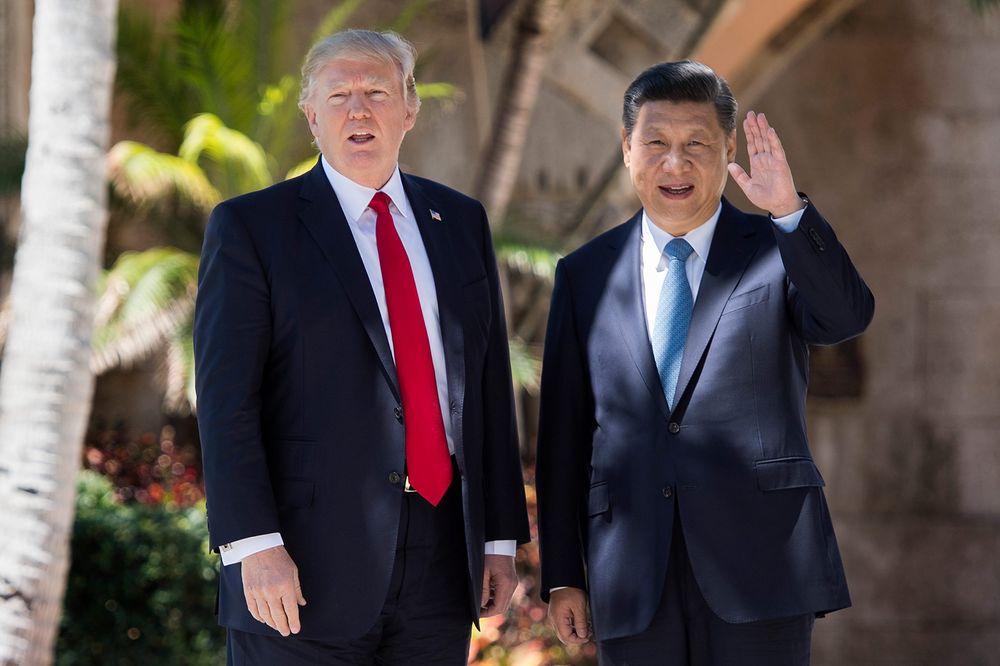Government
Trump-Xi Summit Accomplishment: Getting to Know One Another
Published
8 years agoon

- Trump-Xi Summit Accomplishment: Getting to Know One Another
U.S. officials said President Donald Trump’s first meeting with Chinese President Xi Jinping this week was an opportunity for the leaders of the world’s two largest economies to get to know each other and set up future meetings.
That was the biggest accomplishment after about 18 hours together at Trump’s Mar-a-Lago resort — a visit punctuated by a U.S. missile strike on Syria Thursday night. There were no trade or investment deals announced, no agreement to contain North Korea’s nuclear ambitions, no plan stitched together to reduce tensions in the South China Sea.
A statement from White House Press Secretary Sean Spicer late Friday cited an array of topics the pair and their contingents discussed, from North Korea to cybersecurity to protecting human rights, and said Trump and Xi “established a new and cabinet-level framework” for future talks.
“We have very similar economic interests and there are areas where they clearly want to work with us,” Treasury Secretary Steven Mnuchin told reporters on Friday. “The objective is for us to increase our exports to them.”
Commerce Secretary Wilbur Ross added that “the most interesting thing to me was they expressed an interest in reducing their net trade balance because of the impact it’s having on money supply and inflation. That’s the first time I’d heard them say that.’’
Trump tweeted on Saturday that the meetings had created “tremendous goodwill and friendship” but that “only time will tell on trade.”
China’s leaders in fact have long been concerned about the yawning U.S. trade deficit with their country, $347 billion in 2016. Ross said the two countries agreed to a “100-day plan” to discuss trade; there were few details.
In tone and results, the summit was similar to a 2013 meeting between Xi and President Barack Obama in Rancho Mirage, California, that also produced little by way of tangible announcements. But Trump’s inaugural visit with Xi had a little more drama.
Syria Strike
Trump upended the meeting by ordering the launch of dozens of cruise missiles at Syrian targets on Thursday, just before Xi’s arrival in Florida. The missile strike overshadowed the summit and also increased tension between the two countries over North Korea, days after Trump said in an interview with the Financial Times that he’s willing to take unilateral action against a regime flouting international norms.
Secretary of State Rex Tillerson said “there was no kind of package arrangement discussed to resolve” tensions with North Korea, adding that Xi agreed the situation “has reached a very serious stage in terms of the advancement.”
Trump told Xi the U.S. would “chart our own course if this is something China is just unable to coordinate with us,” Tillerson said.
In his statement, Spicer said the two sides “noted the urgency of the threat” of Pyongyang’s weapons programs, “reaffirmed their commitment to a denuclearized Korean peninsula, and committed to fully implement UN Security council resolutions.”
For China, the meeting was probably a success. Much of the Communist Party’s top leadership will change during a congress later this year, and in the run-up to that event, “Xi Jinping just wants the United States off his back,” said Bonnie Glaser, senior adviser for Asia and the director of the China Power Project at the Center for Strategic and International Studies in Washington. The two leaders appeared to develop a rapport, she said.
‘Positive and Fruitful’
China’s official news agency Xinhua said Saturday that the “positive and fruitful” meetings have sent a “clear-cut” message that Washington and Beijing can become great cooperative partners.
The presidents didn’t mention the Syria attack, and even steered clear in their public remarks of issues like trade that were supposed to dominate the summit.
They remarked generally about “progress” in their relationship and optimism about the future. That could indicate that the relationship between the two countries remains stable, despite Trump’s fiery accusations during his campaign, and afterward, that China has stolen U.S. manufacturing jobs.
“The relationship developed by President Xi and myself, I think, is outstanding,’’ Trump said Friday during a meeting between the two countries’ delegations. “I believe lots of very potentially bad problems will be going away.’’ In a posting on its website on Saturday, China’s foreign ministry said the countries had agreed to “properly” deal with issues of trade friction.
Strolling the Grounds
Xi thanked Trump for his hospitality and said the meeting had served the purpose of advancing the U.S.-China relationship.
“We had long and in-depth communication,’’ Xi said through a translator. “And, more importantly, we have further built up understanding and establish a kind of trust, and we have initially built up a working relationship and friendship.’’
The two leaders were later photographed strolling the grounds of Trump’s waterfront resort. Trump accepted Xi’s invitation to visit China later this year, Tillerson said.
Another matter that didn’t come up was the bankruptcy of Westinghouse Electric Co.’s nuclear reactor business. Toshiba Corp., Westinghouse’s parent company, has sought a buyer for the unit and Trump administration officials are so concerned about Chinese investors obtaining control of it that they have sought an American or allied purchaser.
“We have been looking very carefully at that,” Ross said. Mnuchin added that “any such transaction” would have to be reviewed by the Committee on Financial Investment in the U.S., which can block sales of U.S. companies to foreign investors.
Surface Charm
The friendly banter between the leaders belied growing tension in the relationship after Trump’s public criticisms of China and his promises to extract concessions from the country on trade and North Korea.
“We have been treated unfairly and have made terrible trade deals with China for many, many years,’’ Trump told reporters aboard Air Force One on Thursday as he flew to Palm Beach. “That’s one of the things we are going to be talking about.’’
His Cabinet secretaries said that Trump indeed confronted Xi.
“President Trump noted the challenges caused by Chinese government intervention into its economy,” Tillerson said Friday. ““The president underscored the need for China to take concrete steps to level the playing field for American workers, stressing repeatedly the need for reciprocal market access.”
Trump informed Xi of the missile strike as they were dining, roughly when 59 Tomahawk missiles were hitting a Syrian airfield. Trump told reporters the strike was in response to a nerve gas attack by the Syrian regime against civilians Tuesday.
The Chinese have opposed efforts to remove Syrian dictator Bashar al-Assad from power and probably took offense at the attack, said Dennis Wilder, former senior director for Asia during the George W. Bush administration.
“For President Xi, this will be embarrassing internationally because in so many settings and so many venues China has condemned the United States for unilateral military action in the past, and this is certainly a unilateral action,’’ he said. “I think that the Chinese will be expressing some anger privately to the United States.’’
China’s public probably won’t regard the strike as a message to their leaders unless the Trump administration makes the case explicitly, said Doug Paal, vice president for studies at the Carnegie Endowment for International Peace in Washington.
“I doubt the Chinese in the end think this was really done as a message to Beijing,’’ said Paal, who who served as Asian affairs director in the administrations of Ronald Reagan and George H.W. Bush.
Is the CEO and Founder of Investors King Limited. He is a seasoned foreign exchange research analyst and a published author on Yahoo Finance, Business Insider, Nasdaq, Entrepreneur.com, Investorplace, and other prominent platforms. With over two decades of experience in global financial markets, Olukoya is well-recognized in the industry.

You may like
-
Nigeria: Perpetrators of St. Francis Church Shooting Must Face Justice
-
IMF/IMFC Warns Russia-Ukraine War Has Humanitarian Consequences
-
Russia-Ukraine Conflict: U.S Prepares to Send Troops to Europe
-
Taliban Enter Afghan Capital as US Diplomats Evacuate by Chopper
-
China Urges U.N. States Not to Attend Xinjiang Event Next Week
-
World’s Top Three Cruise Lines Accumulate Over $60 Billion in Debt















